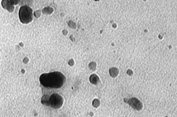Antimicrobial Effect of Silver Nanoparticles on Staphylococcus Aureus
DOI:
https://doi.org/10.31661/gmj.v5i4.684Keywords:
Chlorella Vulgaris, Cap8, Silver Nanoparticle, Staphylococcus Aureus.Abstract
Background: Development of new antimicrobial drugs targeting virulence factors of pathogenic bacteria is an effective strategy to address increasing emergence of resistant bacterial strains. Considering the clinical importance of Staphylococcus aureus and global emergence of antibiotic-resistant strains of this pathogen, the present study was carried out to investigate the inhibitory effects of silver nanoparticles (SNPs) on growth and capsule formation as a virulence factor of S.aureus. Materials and Methods: The SNPs were biologically synthesized by unicellular microalgae Chlorella vulgaris and its inhibitory effect on the growth of S. aureus and expression of capsule encoding gene (cap8) was quantitatively evaluated by serial microdilution and Real-Time PCR; respectively. The growth rate of S. aureus under nanoparticles treatment was monitored in a six-hour interval. Results: The results obtained in this research indicated the formation of monodisperse spherical SNPs that inhibited S. aureus growth at a concentration of 50μg/ml (minimum inhibitory concentration (MIC)=50μg/ml). The growth kinetic analysis showed that S. aureus growth was significantly diminished immediately after treatment. Moreover, the SNPs decreased expression of type 8 capsule (cap8) gene even at concentrations below MIC value. Conclusion: The results of this experiment suggest that biologically synthesized SNPs are fairly ideal candidates for the development of new antimicrobial drugs against S. aureus. [GMJ.2016;5(4):200-7]








